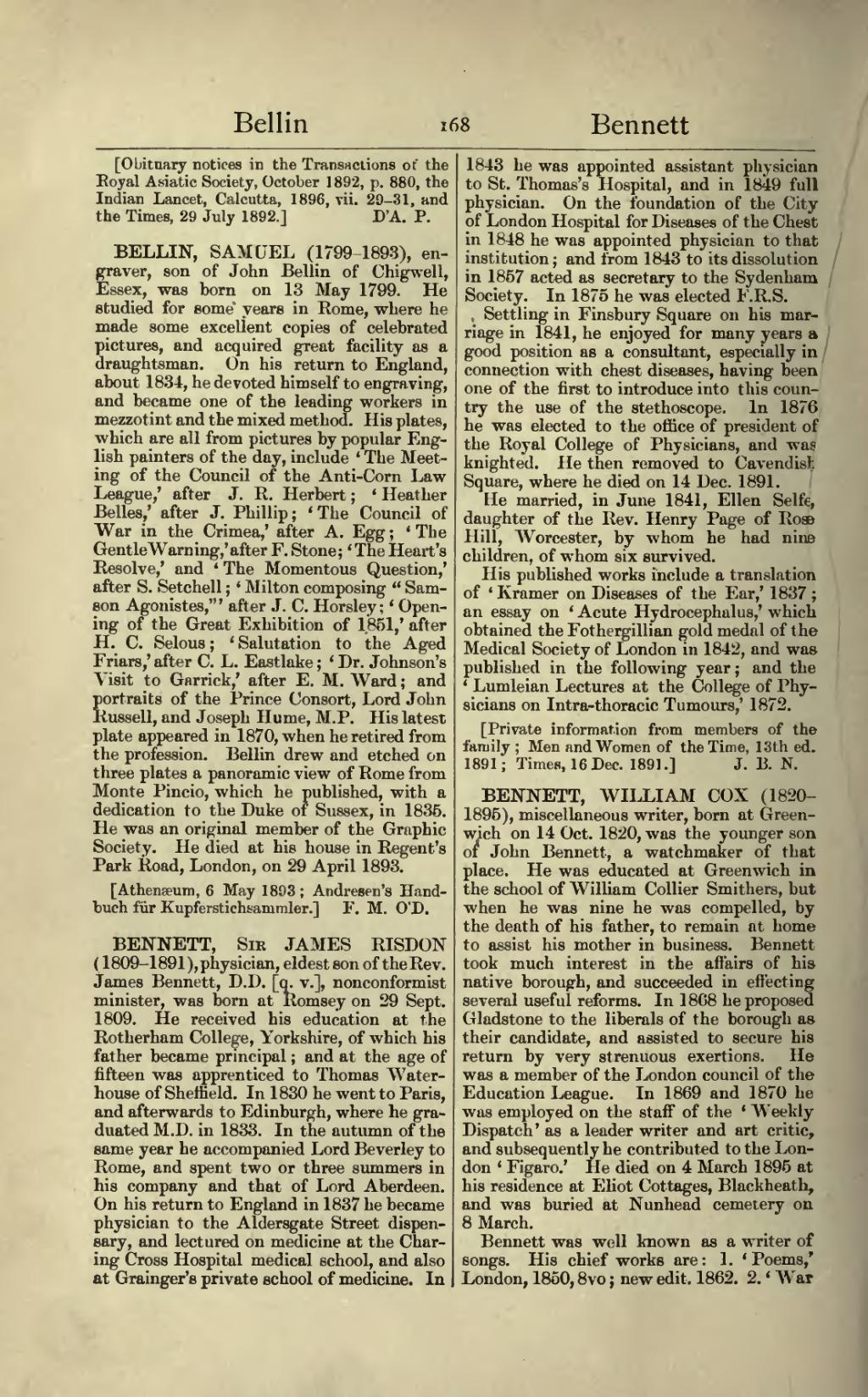[Obituary notices in the Transactions of the Royal Asiatic Society, October 1892, p. 880, the Indian Lancet, Calcutta, 1896, vii. 29–31, and the Times, 29 July 1892.]
BELLIN, SAMUEL (1799–1893), engraver, son of John Bellin of Chigwell, Essex, was born on 13 May 1799. He studied for some years in Rome, where he made some excellent copies of celebrated pictures, and acquired great facility as a draughtsman. On his return to England, about 1834, he devoted himself to engraving, and became one of the leading workers in mezzotint and the mixed method. His plates, which are all from pictures by popular English painters of the day, include 'The Meeting of the Council of the Anti-Corn Law League,' after J. R. Herbert; 'Heather Belles,' after J. Phillip; 'The Council of War in the Crimea,' after A. Egg; 'The Gentle Warning,' after F. Stone; 'The Heart's Resolve,' and 'The Momentous Question,' after S. Setchell; 'Milton composing "Samson Agonistes,"' after J. C. Horsley; 'Opening of the Great Exhibition of 1851,' after H. C. Selous; 'Salutation to the Aged Friars,' after C. L. Eastlake; 'Dr. Johnson's Visit to Garrick,' after E. M. Ward; and portraits of the Prince Consort, Lord John Russell, and Joseph Hume, M.P. His latest plate appeared in 1870, when he retired from the profession. Bellin drew and etched on three plates a panoramic view of Rome from Monte Pincio, which he published, with a dedication to the Duke of Sussex, in 1835. He was an original member of the Graphic Society. He died at his house in Regent's Park Road, London, on 29 April 1893.
[Athenæum, 6 May 1893; Andresen's Handbuch für Kupferstichsammler.]
BENNETT, Sir JAMES RISDON (1809–1891), physician, eldest son of the Rev. James Bennett, D.D. [q. v.], nonconformist minister, was born at Romsey on 29 Sept. 1809. He received his education at the Rotherham College, Yorkshire, of which his father became principal; and at the age of fifteen was apprenticed to Thomas Waterhouse of Sheffield. In 1830 he went to Paris, and afterwards to Edinburgh, where he graduated M.D. in 1833. In the autumn of the same year he accompanied Lord Beverley to Rome, and spent two or three summers in his company and that of Lord Aberdeen. On his return to England in 1837 he became physician to the Aldersgate Street dispensary, and lectured on medicine at the Charing Cross Hospital medical school, and also at Grainger's private school of medicine. In 1843 he was appointed assistant physician to St. Thomas's Hospital, and in 1849 full physician. On the foundation of the City of London Hospital for Diseases of the Chest in 1848 he was appointed physician to that institution; and from 1843 to its dissolution in 1867 acted as secretary to the Sydenham Society. In 1875 he was elected F.R.S.
Settling in Finsbury Square on his marriage in 1841, he enjoyed for many years a good position as a consultant, especially in connection with chest diseases, having been one of the first to introduce into this country the use of the stethoscope. In 1876 he was elected to the office of president of the Royal College of Physicians, and was knighted. He then removed to Cavendish Square, where he died on 14 Dec. 1891.
He married, in June 1841, Ellen Selfe, daughter of the Rev. Henry Page of Rose Hill, Worcester, by whom he had nine children, of whom six survived.
His published works include a translation of 'Kramer on Diseases of the Ear,' 1837; an essay on 'Acute Hydrocephalus,' which obtained the Fothergillian gold medal of the Medical Society of London in 1842, and was published in the following year; and the 'Lumleian Lectures at the College of Physicians on Intra-thoracic Tumours,' 1872.
[Private information from members of the family; Men and Women of the Time, 13th ed. 1891; Times, 16 Dec. 1891.]
BENNETT, WILLIAM COX (1820–1895), miscellaneous writer, born at Greenwich on 14 Oct. 1820, was the younger son of John Bennett, a watchmaker of that place. He was educated at Greenwich in the school of William Collier Smithers, but when he was nine he was compelled, by the death of his father, to remain at home to assist his mother in business. Bennett took much interest in the affairs of his native borough, and succeeded in effecting several useful reforms. In 1868 he proposed Gladstone to the liberals of the borough as their candidate, and assisted to secure his return by very strenuous exertions. He was a member of the London council of the Education League. In 1869 and 1870 he was employed on the staff of the 'Weekly Dispatch' as a leader writer and art critic, and subsequently he contributed to the London 'Figaro.' He died on 4 March 1895 at his residence at Eliot Cottages, Blackheath, and was buried at Nunhead cemetery on 8 March.
Bennett was well known as a writer of songs. His chief works are:
- 'Poems,' London, 1850, 8vo; new edit. 1862.
- 'War
